- Home
- Lou Cameron
Stringer and the Hell-Bound Herd Page 17
Stringer and the Hell-Bound Herd Read online
Page 17
Lord Baltimore said, “Anything is possible. Hear me, nobody is more sneaky than a white outlaw, unless it is a white lawyer. Have you thought about all the wagons they have, out in front and apart from the herd and most of the other riders?”
Lefors said he had. Stringer felt a little like a rat until he considered how much he owed any crooks who killed folk. Once he had he said, “They just bought some water wagons off someone here in town. The last time I saw them they were down the railroad siding, a good piece from Tarington’s camp and the other wagons, so…”
“I looked,” Lefors cut in. “I mean to look again afore I let anyone roll out of town with them big tanks full of water or anything else. Take care here, boys. I got to find out what’s holding up the rest of my backup.”
As he strode off in the gathering dusk, Stringer and Lord Baltimore moved over to the house. The colored woman had gone inside by this time. She’d started her kitchen range but agreed it didn’t cast much light and said she had some candles, somewhere about. As she rummaged for them she explained, “I generally git along just fine by just the ruby gleams of this bitty coal stove, suhs, being I can’t read in the first place and bright lights just draw bugs in the second.”
Stringer said they weren’t there to read, either, and explained the situation. She started to cry. Lord Baltimore growled, “Hear me, old woman, neither of us wants to fuck you.” To which she replied with an anxious wail, “Lordy, that ain’t what I’m afeared of, ugly as some Injuns may be! Them white boys told me they’d blow my black behind off did I tell anyone who’d left them ponies out back, and they’re sure to think I told that other lawman all about „em, no matter what I say, now!”
“We’re not going to let them hurt you,” Stringer soothed. “We don’t want to hurt anyone we don’t have to, either. So why don’t you tell us what they look like, so’s we’ll know it’s them when and if.”
She answered, “Lordy, I told that other lawman. They was just four white boys. I’d never seen „em before and I never heard either of my own boys say they had a mess of white cowboys they socializated with.”
“All four were young and dressed like cowboys?” Stringer persisted and, when she nodded and allowed she’d just said that, Lord Baltimore smiled thinly in the faint light from the stove vent to observe, “Hear me, that narrows it down in a railroad town surrounded mostly by truck farmers.”
Stringer pursed his lips and said, “I’ve seen plenty of old boys sporting Stetsons and spurs since I got here.” But the Indian insisted, “Cowhands known in these parts, or known to the trail herders you rode in with. This is the end of the railroad line. No irrigation lines run much further out, either. This is not the sort of trail town saddle tramps can drift through without being noticed. If anyone has noticed anything, Joe Lefors will soon hear about it. He can be a real pain, asking questions. When people tell them they don’t want to talk to him he just pistol-whips them „til they change their minds.”
Stringer grimaced and said, “So Tom Horn told me when I interviewed him in the Cheyenne jail that time. Were you there when your boss got old Tom to tell him all about the Nickell Murder, whether he knew anything about it or not?”
The Indian shook his head and answered, “No. Joe was working out of Omaha then. I only signed on as a tracker after Joe and those other white boys found out they couldn’t track Butch and Sundance across slick rock. Hear me, I can track anyone, anywhere, as long as nobody messes up their tracks with a whole damned herd of cows!”
Stringer asked if the Wild Bunch had ever pulled that on him over in the Rockies. The Indian shook his head and said, “I’m not sure they pulled it on me here. Butch and Sundance were not old enough to stop trains in the days of the big market drives along the Goodnight Trail over that way. Sundance was growing up on a New Jersey farm as far as that goes. I don’t think either of them ever worked as a cowhand.”
“So what about this gang acting up out our way?” asked Stringer as their colored hostess grudgingly put coffee water on for them at least. Lord Baltimore said, “Those train robbers know about cows and colored men, and where they can be expected to turn up next. Joe thinks the one planning so many robberies close together has been sending coded messages along the Western Union or Western Pacific wire a lot. I think so, too.”
Stringer began to roll a smoke as he asked why the outlaws were still running loose if Lefors knew so much about them. Their colored hostess said there just wasn’t enough snap beans and hog belly for the three of them, but that she’d just recalled a poke of cracked corn in the woodshed, if they’d let her get it. The Indian growled, “My boss said not to let you run around warning anyone. If you can’t find anything to feed us without going outside, you’d better be good in bed. You sure are ugly for a woman who can’t cook!”
She pleaded that she meant to rustle up a grand meal to go with all the cream and sugar in their coffee they might like. The Indian said, “Good, I wasn’t looking forward to fucking you on an empty stomach.” Then, as Stringer had that smoke about built closer to the window Lord Baltimore continued, as if nothing else had happened, “We know lots of things about those outlaws. As soon as we know just a little more we’ll get to arrest them. It was dumb of them to stop that last train this far east of the foothills. It was even dumber of them to head this way, trusting to that market herd to overtake and blur their trail. Hear me, they are at the end of the line, at least four of them, anyway. Once we round them up they will tell us who else they had working with them. They always do.”
It was the worried lady of the house, of all people, who stopped Stringer from replying by gasping, “Oh, Lordy, somebody’s coming, from the front, and what if it’s them?”
Before either man could offer any suggestions the three of them heard a feminine voice trill pleasantly, “Yoo hoo! Are you boys anywhere around here? It’s me, W.R. I brought two rifles, some chocolate cake, and the pleasure of my company if you promise to behave this time, Stuart MacKail!”
Stringer’s exceedingly friendly rival, W.R. Hackman of the Los Angeles Examiner, signed her deliberately asexual byline to the semifiction she wrote for the lurid young William Randolph Hearst. After that was said and done she had other more redeeming qualities.
The box of cake and two loaded long guns she came in with were the least of the saucy little blonde’s charms. Though a tad too short and much too chesty to qualify as the Gibson Girl of current fashion, little W.R. was still pretty as a picture and as Stringer recalled from other times and places, tough as nails in a fight and sweet as sugar in a man’s arms, if she liked him. If she didn’t, W.R. was about as safe to grab hold of as a bushel of bobcats.
As she placed the gifts she’d come bearing on the kitchen table and asked why they couldn’t have more light on the subject, Stringer explained, “We’re staked out for night-crawling outlaws, W.R. What in thunder are you doing in Fallon and how did you ever get here?”
She said, “I just arrived aboard a special down from Reno with a posse of federal deputies. When we got here a few minutes ago we were met by that nice Deputy Le-fors, who told me where you might be and what you might need in the way of weaponry, if I really wanted to help. This cake was my own notion, only now we need a knife and some plates.”
The colored lady of the house took care of that and between the two of them the coffee got poured and the cake divvied up in a jiffy. As the four of them gathered „round to dig in, Stringer got the reasons for the pretty newspapergal’s long haul up from L.A. out of her, a mouthful at a time.
W.R. allowed she’d been following up on one story over Sacramento way when she’d heard he was on this side of the divide, pestering others who might be involved in the same business scandal. So naturally she’d hopped a train east to pester him or, as she liked to call it, compare notes in hopes of sharing a better story than either could write alone. When she evoked the mining fraud scandal they’d both worked on that time in Tombstone, Stringer washed down the lump of cake in h
is mouth to ask her what sort of a scandal she was working on, adding, “Sam Barca sent me to do some Sunday feature nostalgia on an old-timey cattle drive. This rash of train robberies broke out about the same time and, to tell the truth, I’m not sure which I’m covering right now. Your turn.”
W.R. said, “They may be connected, according to your Deputy Marshal Joe Lefors. To begin at the beginning, the board of directors of the otherwise reputable Great Basin Beef Incorporated just had one of their vice presidents arrested for cooking the company books in Sacramento. It seems he was living beyond his means with both a wife and mistress charging everything they felt they might need to his account.”
Stringer whistled and said, “One free-spending gal could get a gent in trouble at the bank.” To which she demurely replied, “It did. The poor man must have been indulging in strong drink or worse as well. For even as the bookkeepers were pointing out how much black ink in his ledgers should have really been red, he kept blathering on about some slick business venture that was going to make all of them rich, if only they’d give him more time.”
She helped herself to a daintier nibble of cake, washed it down with a genteel sip, and continued, “Company accountants not being as interested in Crime and Punishment as Profit, they told him they were listening. But all they could get out of him was a further admission of guilt, or total confusion. Isn’t that what you’ve been following up on for dear old Sam, Stuart, that herd of Great Basin Beef on its way to a ghost town way out on the desert in August?”
Stringer scowled at her in the tricky light, wishing he could tell if there was any mockery in her often laughing as well as big blue eyes. He said, “I’ve been riding with that market herd a good seventy-two hours, now. I’ll allow some of their newer riders, as well as Sam and me, find the final destination mighty curious. But up to now there was supposed to be at least somebody left in Wagon Springs to take delivery!”
She shook her head and insisted, “Not since the mine bottomed out about the time I was starting to sit up in my crib. The Nevada State and Federal Bureau of Mines confirms that, Stuart. The poor harrassed swindler in Sacramento, his name is Swyft, if you enjoy irony, finally confessed he’d made up a new mining strike and, of course, the mining company selling mining stock. The only people who’ve been anywhere near Wagon Springs within years feel sure they’d have noticed if anyone was in the meat business there. The place was visited about a year ago by a squaw man and his breed kids, salvaging scrap metal.”
Stringer said, “Good grief, I have to tell Chuck Tarington and his boys, lest they push off into the desert without me! Once they leave here there’ll be no way to communicate with „em until they make it all the way out to …Now why in thunder would even an embezzler want to…what did he do, W.R. ?”
She said, “They’re still trying to get him to admit it. In sum, and all they know for sure, is that he was writing off money he took for his own use as the purchase price of beef cattle. Why he sent less than half the beef he said he’d bought with company funds in such an odd direction has me confused as well.”
Stringer finished his cup and started to rise, saying, “I suspect I see the light at last. Beef on the hoof can’t be tallied unless it’s in sight of those questioning your tally.”
Lord Baltimore growled, “Sit down, MacKail. I have been listening. I see why a crooked cattle buyer might want to send half as many cows as he paid for out into bad country to get lost. Hear me, you have a good pony. You can catch up with that herd before they go far enough out to get in real trouble. Meanwhile, Joe Lefors is counting on the two of us to stay here and watch for anyone reclaiming those other ponies out back. I have spoken.”
Stringer started to ask little W.R. to carry the message in his place. He decided he liked her too much. Old Tarington had mellowed a mite since their first encounter, it was true, but he was still a mite uncouth and might not know old W.R. was a ball kicker just by looking at her.
Then the night was rent by the not-too-distant crackle of small arms fire, punctuated by repeated shotgun blasts. Stringer told the two women to run out in the front yard and hit the dirt as he grabbed up his .30-30 and moved to the rear window. Lord Baltimore shoved the kitchen door and flopped flat on the sill with his own carbine trained on the corral out back. But while the stock inside the rails milled just a mite because of the gunshots from over by the railroad, nothing on two legs seemed to be stirring over by the corral.
Stringer had noticed when they’d first met down in Tombstone that W.R. Hackman didn’t seem to like to take orders from a man and could, in fact, be sort of bossy in bed. So he was more annoyed than surprised when she wound up beside him at the window instead of out front with that other woman at a time like this. She had her own nickel-plated .32 in one dainty fist, but instead of aiming it at anyone in particular she told him, “Some men are coming down the street, out front instead of from the back, dear.”
So Stringer was at the front door with W.R. covering the same yard from a parlor window, as Joe Lefors called out, “Hold your fire, boys. The war seems to be over. Four gents in riding duds just tried to hop a freight backing out of town and when Deputy Jenkins asked how come they slapped leather by way of an answer.”
“Is Will Jenkins still with us?” asked Lord Baltimore from the dark as he joined Stringer and W.R. while Lefors and his own backup came across the yard.
In a more casual tone than Stringer might have used, Lefors said, “The doc figures Jenkins will make it if none of his flesh wounds fester in the next few days. That’s more’n can be said for the smart-ass sons of …Oh, sorry, ma’am. I didn’t see you in that window there. Suffice it to say all four of „em are shot up pretty good but we ought to be able to photograph „em good enough for ID once they’ve been hosed down and the sun comes up.”
W.R. said, “I’ll bet they were the ones who left those four ponies out back.” To which Lefors replied smugly, “No bet about „em, little lady. Couple of local farm boys has already told us that much. They’d been drinking in town at least a night or more and that one paint pony out back spent some time in front of the Western Union afore it was abandoned so slick with the other three.”
W.R. asked how they knew that and Stringer told her, “They rode this way with their loot after stopping a train between here and the foothills. Had they just turned four ponies loose, like stray dogs, someone would have noticed before they were set to leave by train, the sneaky way.”
He asked Lefors, “Can we assume to have recovered all those silver dollars, Joe?” He wasn’t too surprised when Lefors replied in a disgusted voice, “They didn’t have a hundred dollars in any form between „em. So they cached at least a few hundred pounds of specie somewhere around here, and now I mean to find it, no matter where in thunder those owlhoots hid it!”
CHAPTER FIFTEEN
Lefors and his federal posse didn’t seem to mind Stringer and little W.R. tagging along, at first. But by midnight everyone was growling some and Joe Lefors was getting downright surly. They’d taught Stringer in Journalism One at Stanford that most folk didn’t mind what you wrote about them for your paper as long as you spelled their name right. But Joe Lefors had seen his name in print more than once in the past, and Stringer hadn’t been the only one to comment on his roughhewn methods and casual approach to justice. Neither Stringer nor W.R. Hackman had any intention of accusing Lefors of shooting first and asking questions later, this time. The four dead men had in fact slapped leather first in front of witnesses and Stringer was sure he’d seen one of those shot-up and torch-lit faces before, perhaps on a reward poster. But Lefors still felt, with some justification, he was apt to have a time proving all four of the dead rascals had ridden off with all that money unless he could somehow find the infernal money and that seemed easier to say than do.
It wasn’t on or about the property of the innocent colored family they’d forced their embarrassing horseflesh upon. The railroad vouched for the three men on their payroll and, when
reached by wire in distant parts, neither the father nor sons could recall any white pals answering to those descriptions.
It was W.R., cuss her suspicious nature, who pointed out that anyone leaving his pinto in front of Western Union long enough to attract notice could have learned most anything by wire from some confederate. Joe Lefors said he’d already figured easier ways the crooks could know there was nobody home but a timid colored gal when it came time to get rid of their ponies. He had his boys probe about the property just the same and never bothered to say he was sorry when they didn’t find any signs of recent digging in the summer-baked adobe soil.
Stringer tagged along as much to save trouble as out of curiosity when Lefors and his whole posse descended on the camp of Chuck Tarington on the far side of the railroad yards. Stringer tried in vain to get W.R. to wait for him at the one hotel in town. But she told him not to take anything half so fresh for granted and insisted on tagging along, whether her ears got burnt by cowboy cussing or not.
As it turned out, the boys sounded more worried than bellicose as Stringer hailed the fire. Chuck Tarington wasn’t there and both his segundo, Ben, and Grits, the cook, sounded anxious about that. Ben said, “We just got a mighty odd telegram from the cattle outfit as owns all these fool cows. I don’t know how they expect us to even answer „em without the boss here.”
Grits offered, “We sent Lefty and Reb over to, ah, Chuck’s last knowed address when he didn’t show up for supper. Nobody in town seems to know where Chuck might be.”
Joe Lefors said, “That’s neither here nor yonder. I’d like to search this camp for stolen specie if it’s all the same to you boys.”

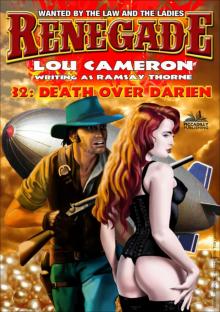 Renegade 32
Renegade 32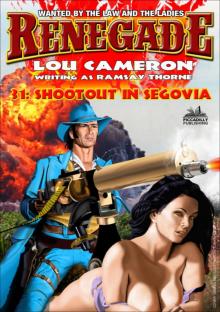 Renegade 31
Renegade 31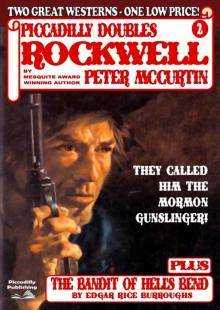 Piccadilly Doubles 2
Piccadilly Doubles 2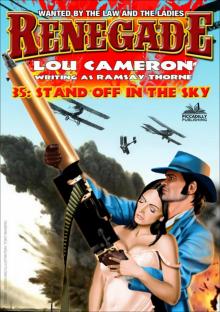 Renegade 35
Renegade 35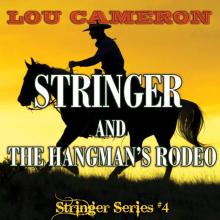 Stringer and the Hangman's Rodeo
Stringer and the Hangman's Rodeo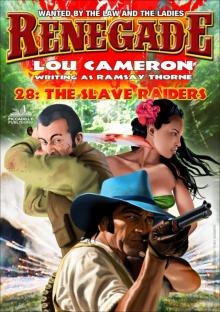 Renegade 28
Renegade 28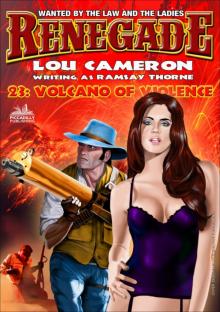 Renegade 23
Renegade 23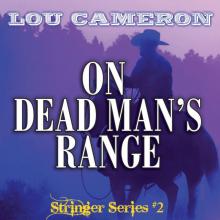 On Dead Man's Range
On Dead Man's Range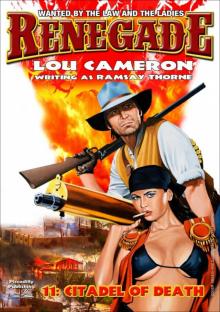 Citadel of Death (A Captain Gringo Western Book 11)
Citadel of Death (A Captain Gringo Western Book 11)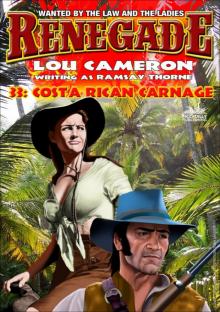 Renegade 33
Renegade 33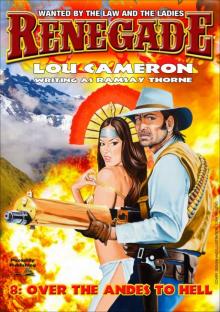 Over the Andes to Hell (A Captain Gringo Western Book 8)
Over the Andes to Hell (A Captain Gringo Western Book 8)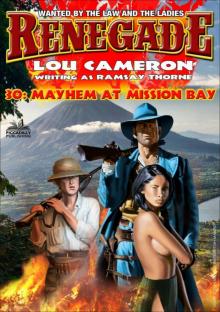 Renegade 30
Renegade 30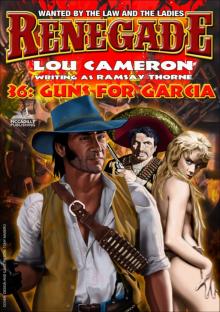 Renegade 36
Renegade 36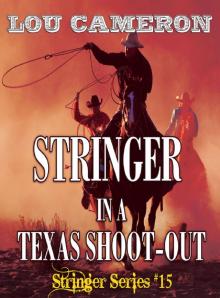 Stringer in a Texas Shoot-Out
Stringer in a Texas Shoot-Out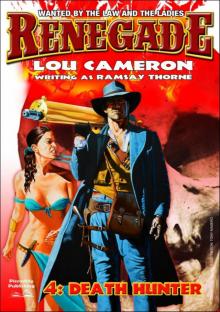 The Death Hunter
The Death Hunter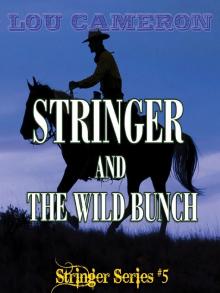 Stringer and the Wild Bunch
Stringer and the Wild Bunch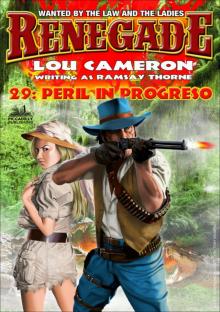 Renegade 29
Renegade 29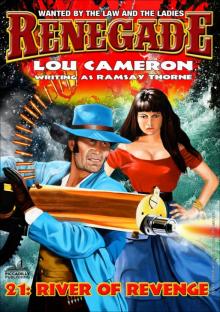 Renegade 21
Renegade 21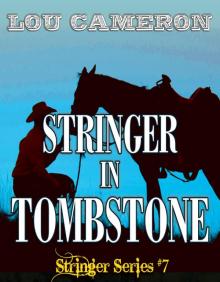 Stringer in Tombstone
Stringer in Tombstone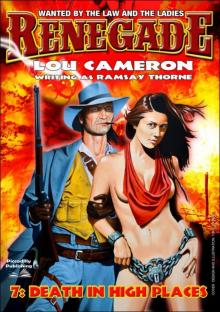 Death in High Places (A Renegade Western Book 7)
Death in High Places (A Renegade Western Book 7)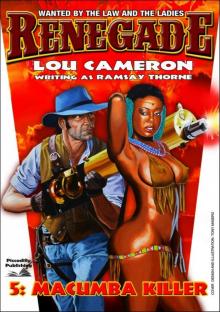 Macumba Killer
Macumba Killer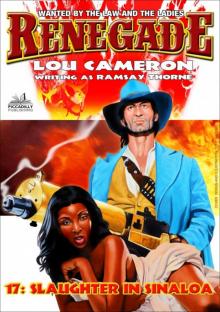 Renegade 17
Renegade 17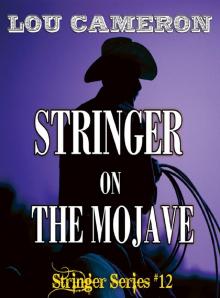 Stringer on the Mojave
Stringer on the Mojave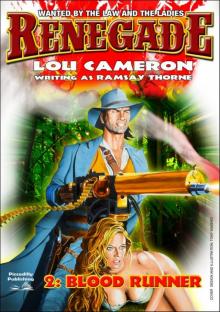 Blood Runner
Blood Runner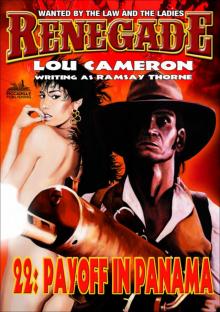 Renegade 22
Renegade 22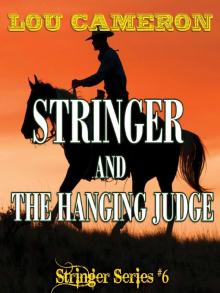 Stringer and the Hanging Judge
Stringer and the Hanging Judge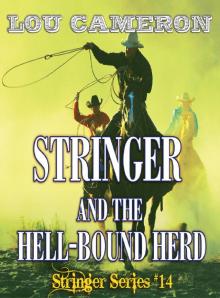 Stringer and the Hell-Bound Herd
Stringer and the Hell-Bound Herd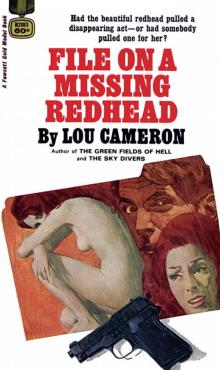 File on a Missing Redhead
File on a Missing Redhead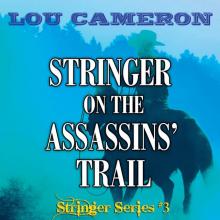 Stringer on the Assassins' Trail
Stringer on the Assassins' Trail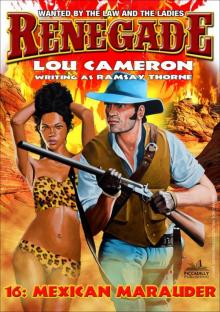 Mexican Marauder (A Captain Gringo Adventure #16)
Mexican Marauder (A Captain Gringo Adventure #16)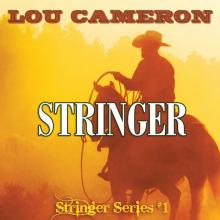 Stringer
Stringer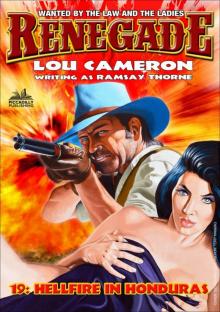 Renegade 19
Renegade 19 Stringer and the Oil Well Indians
Stringer and the Oil Well Indians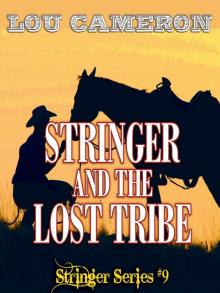 Stringer and the Lost Tribe
Stringer and the Lost Tribe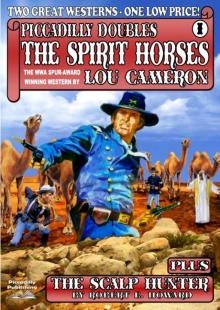 Piccadilly Doubles 1
Piccadilly Doubles 1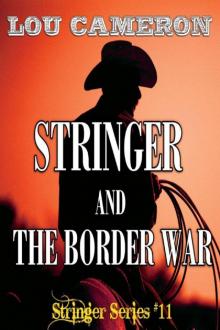 Stringer and the Border War
Stringer and the Border War Renegade
Renegade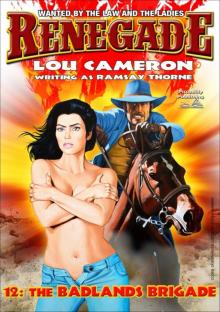 The Badlands Brigade (A Captain Gringo Adventure Book 12)
The Badlands Brigade (A Captain Gringo Adventure Book 12)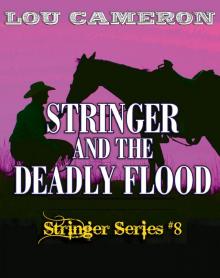 Stringer and the Deadly Flood
Stringer and the Deadly Flood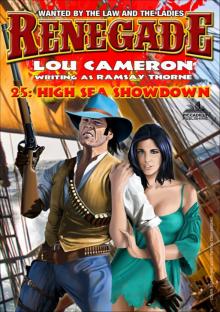 Renegade 25
Renegade 25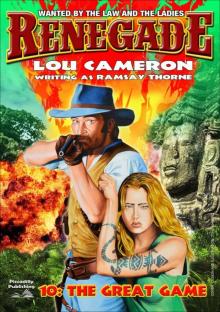 The Great Game (A Captain Gringo Western Book 10)
The Great Game (A Captain Gringo Western Book 10)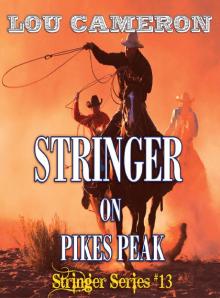 Stringer on Pikes Peak
Stringer on Pikes Peak